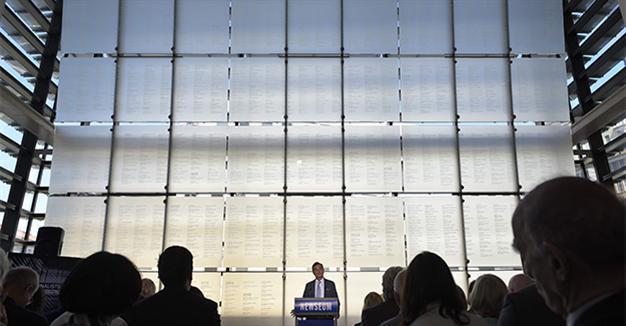Syrian journalists killed in Turkey added to journalist memorial in Washington DC
WASHINGTON - Agence France-Presse

AFP photo
Eight journalists killed in the 2015 attack on French satirical magazine Charlie Hebdo and two Syrian online journalists killed in Turkey have had their names added to a U.S. memorial honoring reporters killed in the exercise of their profession. The memorial wall at the Newseum, a Washington museum of news and journalism, added June 6 the names of 20 people killed last year, as a reminder of the threats faced by journalists in many parts of the world.The two Syrian online journalists, Ibrahim Abd al-Qader and Fares Hamadi, were killed in Turkey after being lured to an interview with a purported defector from the Islamic State of Iraq and the Levant (ISIL).
Also honored were two U.S. television journalists shot to death on live TV and reporters, bloggers and camera operators killed in Bangladesh, Brazil, Democratic Republic of Congo, Iraq, Mexico, Pakistan, Somalia and Syria.
The ceremony came in the wake of the weekend death of American journalist David Gilkey and his Afghan translator covering the conflict in Afghanistan, the latest somber reminder of the risks run by journalists.
Newseum president and chief executive Jeffrey Herbst told a ceremony that these 20 were just a fraction of the reporters who lost their lives in 2015.
According to the press watchdog Reporters Without Borders (RSF), a total of 110 journalists were killed around the world last year.
With the annual rededication, Herbst said, “we seek to remind our society and societies across the world of the sacrifice and also... what has to be done to promote an informed society.”
“Governments, rebel groups, insurgents now all recognize that control of information is important and thus they kill and intimidate journalists and bloggers in hope of furthering their cause,” he told the ceremony.
Herbst said that 2015 “was an especially tragic year for journalists, and that is why we selected 20, a much higher number than usual, to represent all of those killed.”
France’s U.S. ambassador Gerard Araud told the audience that the attack on Charlie Hebdo by Islamist gunmen in January 2015 “showed us why we so ardently defend the right to speak and to draw without censorship.”
Araud added that “defending a free and independent press is deeply rooted in our respective cultures and protected by our founding texts” and that the fight for a free press is inextricably tied to broader security issues.
“Defending the press means today fighting Daesh,” he said, using an Arabic acronym for ISIL.
“To thwart attacks on journalists and others means participating in the coalition against terrorism, to thwart those who work to undermine our values,” Araud said.
Those honored at the ceremony June 6 included Charlie Hebdo’s Stephane Charbonnier, Georges Wolinski, Jean Cabut, Elsa Cayat, Philippe Honore, Bernard Maris, Mustapha Ourrad and Bernard Verlhac.
Also included were TV reporter Alison Parker and cameraman Adam Ward, killed by a disgruntled former reporter while conducting a live interview in Virginia.
Others whose names were added were:
-- Avijit Roy, a Bangladeshi-American blogger, killed with his wife by machete-wielding attackers in Dhaka.
-- Gleydson Carvalho of Brazil’s Radio Liberdade, killed by gunmen at his radio station.
-- Soleil Balanga, a radio journalist slain in a knife attack in the Democratic Republic of Congo.
-- Yahya Abdul Hamid, an Iraqi radio reporter kidnapped and killed after ISIL overtook Mosul.
-- Mexican photojournalist Ruben Espinosa Becerril, found dead after covering a crackdown on student protesters.
-- Zaman Mehsud, a Pakistani journalist covering the conflict-torn Waziristan region, shot by gunmen on a motorcycle.
-- Somali journalist Hindia Haji Mohamed, killed in a car bomb three years after taking over for her husband who died in a suicide bombing.
-- Kenji Goto, a Japanese video journalist and writer executed by ISIL in Syria, where he traveled in an attempt to rescue a friend kidnapped by the organization.
















